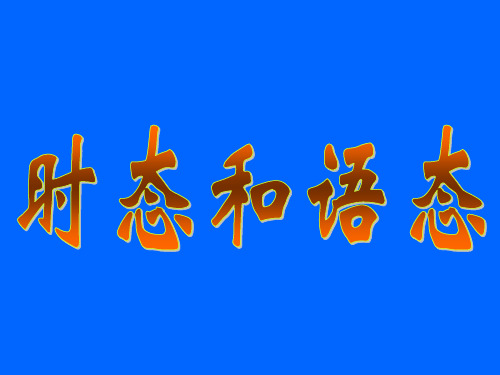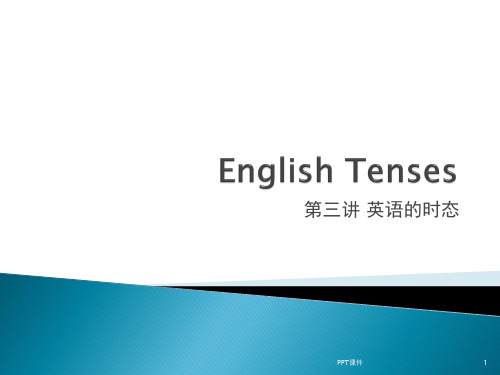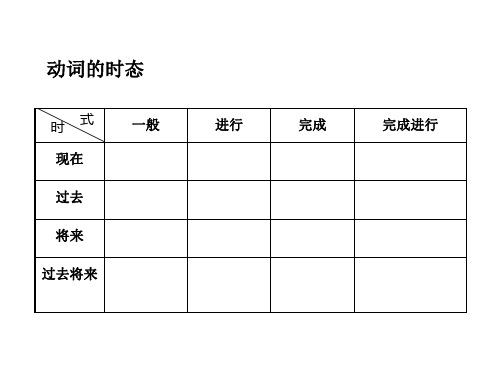英语语法16种时态介绍PPT课件
合集下载
高中英语语法时态和语态课件(共69张PPT)

不能用 be+v-ing, be+v-ing表示将来,主要强调已经 作出的 安排,e.g. i’m pic you up at 6:00,don’t forget. ) ②强调某个意图是事先考虑好的:
--ann is in hospital.
--yes, i know. i’m going to visit her tomorrow.
--oh,really? i didn’t know. i’ll go and visit her. 2〕表示迹象表明要发生某事,则只能用be going to,e.g.
look at the dark clouds.it’s going to rain. 3〕be going to还有以下用法,e.g. ①强调主观想法或意图: i’m going to wash the car if i have time. (注意:此时
②It was then a small fishing village.
2.特别用法:
1〕表客气或委婉的现在:
①I wondered if you were free this evening.
②I thought you might like some flowers.
(注:过去进行时也可表示现在使语气更委婉、客气,eg.① I was wondering if you could give me a lift. ②We were hoping you would stay with us.能这样用的动 词主要限于want, wonder , think, hope, intend等少数 动词。)
②Someone has broken the window.(结果: 窗户仍破 着)
2〕持续性用法:该用法表示一个过去发生的动作在过去 并未在过去完成,而是持续到现在,且可能继续持续下去 或可能到此结束,e.g.
--ann is in hospital.
--yes, i know. i’m going to visit her tomorrow.
--oh,really? i didn’t know. i’ll go and visit her. 2〕表示迹象表明要发生某事,则只能用be going to,e.g.
look at the dark clouds.it’s going to rain. 3〕be going to还有以下用法,e.g. ①强调主观想法或意图: i’m going to wash the car if i have time. (注意:此时
②It was then a small fishing village.
2.特别用法:
1〕表客气或委婉的现在:
①I wondered if you were free this evening.
②I thought you might like some flowers.
(注:过去进行时也可表示现在使语气更委婉、客气,eg.① I was wondering if you could give me a lift. ②We were hoping you would stay with us.能这样用的动 词主要限于want, wonder , think, hope, intend等少数 动词。)
②Someone has broken the window.(结果: 窗户仍破 着)
2〕持续性用法:该用法表示一个过去发生的动作在过去 并未在过去完成,而是持续到现在,且可能继续持续下去 或可能到此结束,e.g.
英语的时态和语态 ppt课件

He worked for us
PPT课件
8
am/are/is+going to+do 或
will/shall+do
am/is/are/about to + do
am/is/are to + do;
一般将来时的表达方法
be going to +动词原形
be +不定式,be to+动词原形,be about to +动词原形
by the end of + 过去的时间点。如:
We had learnt over two thousand English words by the end of last t erm.
before + 过去的时间点。如:
They had planted six hundred trees before last Wednesday.
例:He is working.
PPT课件
12
肯定句:主语+was/were+doing+其它
否定句:主语+was/were+not+doing+其它
一般疑问句及答语:Was/Were+主语+doing+其
它 ;答语:Yes,I主语+was/were./No,I主语+wasn't/w
eren't.
He usually goes to work at 7 o’clock every morning. 他每天7点上班。 2、现在进行时 表说话时或目前一段时间内正在进行的活动:或表感情色彩,加强语气。与频
英语十六种时态ppt课件

He went swimming yesterday. 昨天他去游泳了。 He was ill yesterday. 他昨天病了。
6
2.一般过去时的肯定、疑问、否定三种形式
肯定式
疑问式
否定式
I worked.
Did I work?
I did not work.
He (She, It)worked. Did he (she, it) work? He (She, It) did not work.
13
范围扩展
1. 用过去进行时表示现在主要是为了使语气委婉、客气。 I was wondering if you can give me a lift. 我不知你能否让我搭一下车。 (一般过去时也有类似用法,但比较而言,用过去进
行时显得更客气,更加不肯定。)
2.动词be的过去进行时也可表示过去一时的表现或暂时的 状态。
现在进行时表示说话时正在进行的动作或表示目前一段时 间内正在进行的活动,与现在进行时连用的时间状语有now, these days等。
—What is your mother doing now? 你的妈妈正在干什么? —She is cooking for us. 她正在为我们做饭。 2.现在进行时的具体用法
10
用法
例句
(1) 说话瞬间正在发生的动作,常见的时间 They are watching TV now.
状语有now,at the moment等。如果句首有 他们现在正在看电视。
警示性动词look,listen等,主句的动词也 Listen! The bird is singing in the tree.
(2) be (am, is, are) going to + 动词原形 2.一般将来时的用法
6
2.一般过去时的肯定、疑问、否定三种形式
肯定式
疑问式
否定式
I worked.
Did I work?
I did not work.
He (She, It)worked. Did he (she, it) work? He (She, It) did not work.
13
范围扩展
1. 用过去进行时表示现在主要是为了使语气委婉、客气。 I was wondering if you can give me a lift. 我不知你能否让我搭一下车。 (一般过去时也有类似用法,但比较而言,用过去进
行时显得更客气,更加不肯定。)
2.动词be的过去进行时也可表示过去一时的表现或暂时的 状态。
现在进行时表示说话时正在进行的动作或表示目前一段时 间内正在进行的活动,与现在进行时连用的时间状语有now, these days等。
—What is your mother doing now? 你的妈妈正在干什么? —She is cooking for us. 她正在为我们做饭。 2.现在进行时的具体用法
10
用法
例句
(1) 说话瞬间正在发生的动作,常见的时间 They are watching TV now.
状语有now,at the moment等。如果句首有 他们现在正在看电视。
警示性动词look,listen等,主句的动词也 Listen! The bird is singing in the tree.
(2) be (am, is, are) going to + 动词原形 2.一般将来时的用法
英语语法16种时态介绍ppt课件

I'll write to you as soon as I arrive there. • 由if 引导的条件状语从句中可以用shall或will表
“意愿”,但不表示时态。
If you will accept my invitation and come to our party, my family will be pleased.如果你愿意接受并 参加我们的舞会,我的家人会非常高兴。
6)祈使句中 ( to give directions or instructions ) Go down the street, and then take the second turning on
the left.
知识扩展:一般现在时表将来
1)下列动词:come, go, arrive, leave, start, begin, return的一般 现在时表将来。这主要用来表示在时间上已确定或安排好的 事情 ( timetabled or fixed events )。 The train leaves at six tomorrow morning. When does the bus start? It starts in ten minutes.
You are always changing your mind. You are always doing well
He’s always asking the same question. 6. 状态动词的进行时后面接形容词brave; careful; stupid; clever; foolish; polite; kind; shy等时,为 主语所表现的非一般惯性特点或故意的行为。
6 )在the more…the more…句型中,从句也要用一 般现在时取代将来时。
“意愿”,但不表示时态。
If you will accept my invitation and come to our party, my family will be pleased.如果你愿意接受并 参加我们的舞会,我的家人会非常高兴。
6)祈使句中 ( to give directions or instructions ) Go down the street, and then take the second turning on
the left.
知识扩展:一般现在时表将来
1)下列动词:come, go, arrive, leave, start, begin, return的一般 现在时表将来。这主要用来表示在时间上已确定或安排好的 事情 ( timetabled or fixed events )。 The train leaves at six tomorrow morning. When does the bus start? It starts in ten minutes.
You are always changing your mind. You are always doing well
He’s always asking the same question. 6. 状态动词的进行时后面接形容词brave; careful; stupid; clever; foolish; polite; kind; shy等时,为 主语所表现的非一般惯性特点或故意的行为。
6 )在the more…the more…句型中,从句也要用一 般现在时取代将来时。
时态语态-专升本ppt课件

返回
为了规范事业单位聘用关系,建立和 完善适 应社会 主义市 场经济 体制的 事业单 位工作 人员聘 用制度 ,保障 用人单 位和职 工的合 法权益
考点一:表示永恒的真理,即使出现在过去的语境里,也要 用一般现在时。
I learned that the earth is bigger than the moon when I was in primary school. 考点二:在时间和条件状语从句中,代替一般将来时。常用的 引导词有: 时间:when, until, after, before, as soon as, once, the moment / the minute, the day; 条件:if, unless, provided I will let her know if she comes back. 考点三:在the more…the more…句型中,若主句是一般将来 时,从句通常用一般现在时。
Has it stopped raining yet?
My girlfriend has been back already.
考点三:表示“最近几世纪、年、月以来…”时间状语中,谓 语动词用现在完成时。
In the past few years/months/weeks/days; over the past few years; during the last three months; for the last few centuries; through centuries; throughout history…etc.
考点一:used to do 表示过去习惯做,但现在已不再做的事。 区别:be/become/get used to doing 表示现在习惯做某事。
为了规范事业单位聘用关系,建立和 完善适 应社会 主义市 场经济 体制的 事业单 位工作 人员聘 用制度 ,保障 用人单 位和职 工的合 法权益
考点一:表示永恒的真理,即使出现在过去的语境里,也要 用一般现在时。
I learned that the earth is bigger than the moon when I was in primary school. 考点二:在时间和条件状语从句中,代替一般将来时。常用的 引导词有: 时间:when, until, after, before, as soon as, once, the moment / the minute, the day; 条件:if, unless, provided I will let her know if she comes back. 考点三:在the more…the more…句型中,若主句是一般将来 时,从句通常用一般现在时。
Has it stopped raining yet?
My girlfriend has been back already.
考点三:表示“最近几世纪、年、月以来…”时间状语中,谓 语动词用现在完成时。
In the past few years/months/weeks/days; over the past few years; during the last three months; for the last few centuries; through centuries; throughout history…etc.
考点一:used to do 表示过去习惯做,但现在已不再做的事。 区别:be/become/get used to doing 表示现在习惯做某事。
英语时态ppt课件

I’m afraid he’s dying soon. =I’m afraid he’ll die soon.
I was told that she was leaving for New York the next day. = I was told she would leave for New York the next day.
3. 一般将来时 (in future / in the future / from now on / soon / in 5 years / next year / in the 22nd century…)
构成法: will/shall + 动词原形
In future, we’ll pay more attention to the protection of our environment.
3. 有部分动词(主要是短暂性动作动词)可以用进行时代替 将来时,即:用现在进行时代替一般将来时,用过去进行时 代替过去将来时. (也可用将来时)
Are you doing anything special this evening ? =Are you going to do anything special this evening?
Yesterday afternoon, he was painting me a picture. Now I ‘m going to see whether he has finished it. (强调paint这一动作过去在进行,但未交代是否已做完)
-----Why didn’t you answer my phone call last night ?
构成法: had + 动词过去分词
I was told that she was leaving for New York the next day. = I was told she would leave for New York the next day.
3. 一般将来时 (in future / in the future / from now on / soon / in 5 years / next year / in the 22nd century…)
构成法: will/shall + 动词原形
In future, we’ll pay more attention to the protection of our environment.
3. 有部分动词(主要是短暂性动作动词)可以用进行时代替 将来时,即:用现在进行时代替一般将来时,用过去进行时 代替过去将来时. (也可用将来时)
Are you doing anything special this evening ? =Are you going to do anything special this evening?
Yesterday afternoon, he was painting me a picture. Now I ‘m going to see whether he has finished it. (强调paint这一动作过去在进行,但未交代是否已做完)
-----Why didn’t you answer my phone call last night ?
构成法: had + 动词过去分词
英语时态讲解讲义PPT课件
1.They’ve already won a game. 2. Have you got the plan ready yet? ----No, not yet. 3. I have just got a letter. 4. Have you ever seen each other before?
★表示主语现在的状态、能力、爱好、职业、性格。
His mother is a doctor. ★表示客观真理、科学真理、自然界的普片现象或众人所知的
客观事实。
The moon goes around the earth. ★表示格言或警句。
All men die. ★在when, as soon as, before, while, so (as) long as等引导的时间
实意动词
V-s
主语是第三人称单数 + V-es
V-ies
have的第三人称单数为has
2021
7
1. He often __g_oe_s__ (go) to school on foot. 2. His character __is__ (be) like his father. 3. I will tell you when he _c_o_m_e_s(come) back. 4. Good begun __is__ (be) half done. 5. Bitter pills __h_a_v_e(have) wholesome effects. 6. As the old saying _g_o_e_s_ (go). 7. Light _tr_a_v_e_ls(travel) faster than sound. 8. Here c_o_m__es_ (come) the bus. 9. There __go_e_s__ (go) the bell. 10. If it d_o_e_s_n_’t_r_a_in( not rain) tomorrow, we’ll go to have a picnic.
★表示主语现在的状态、能力、爱好、职业、性格。
His mother is a doctor. ★表示客观真理、科学真理、自然界的普片现象或众人所知的
客观事实。
The moon goes around the earth. ★表示格言或警句。
All men die. ★在when, as soon as, before, while, so (as) long as等引导的时间
实意动词
V-s
主语是第三人称单数 + V-es
V-ies
have的第三人称单数为has
2021
7
1. He often __g_oe_s__ (go) to school on foot. 2. His character __is__ (be) like his father. 3. I will tell you when he _c_o_m_e_s(come) back. 4. Good begun __is__ (be) half done. 5. Bitter pills __h_a_v_e(have) wholesome effects. 6. As the old saying _g_o_e_s_ (go). 7. Light _tr_a_v_e_ls(travel) faster than sound. 8. Here c_o_m__es_ (come) the bus. 9. There __go_e_s__ (go) the bell. 10. If it d_o_e_s_n_’t_r_a_in( not rain) tomorrow, we’ll go to have a picnic.
动词的时态和语态-PPT课件
8. The man _h_a_d__h_o_p_e_d__ (hope) to catch the last train, but he was too late.
9. The boys __w_e_r_e_p_l_a_y_in_g___ (play) basketball from 5:00 to 6:00 yesterday.Βιβλιοθήκη .19练习
.
20
用所给动词的正确形式填空: 1. She _l_e_ft__ (leave) the office two
hours ago. 2. As son as she arrived home, the girl
discovered that she _h_a_d__t_a_k_e_n__ (take) her friends book by mistake. 3. Who _c_o_m__e_s__ (come) to school earliest in your class every morning? 4. Great changes _h_a_v_e_t_a_k_e_n_p__la_c_e__ (take place) in this city since 1979. 5. By the time he was twelve, Edison _h_a_d__b_e_g_u_n_ (begin.) to sell newspape21rs.
I’ll go to see you when I have time. I’ll go to see you if I have time tomorrow. 2. 某些动词,如:stand, continue, wish, love, like, hate, feel, find, think等常用一般现在时态
9. The boys __w_e_r_e_p_l_a_y_in_g___ (play) basketball from 5:00 to 6:00 yesterday.Βιβλιοθήκη .19练习
.
20
用所给动词的正确形式填空: 1. She _l_e_ft__ (leave) the office two
hours ago. 2. As son as she arrived home, the girl
discovered that she _h_a_d__t_a_k_e_n__ (take) her friends book by mistake. 3. Who _c_o_m__e_s__ (come) to school earliest in your class every morning? 4. Great changes _h_a_v_e_t_a_k_e_n_p__la_c_e__ (take place) in this city since 1979. 5. By the time he was twelve, Edison _h_a_d__b_e_g_u_n_ (begin.) to sell newspape21rs.
I’ll go to see you when I have time. I’ll go to see you if I have time tomorrow. 2. 某些动词,如:stand, continue, wish, love, like, hate, feel, find, think等常用一般现在时态
英语的时态和语态 ppt课件
He worked for us
PPT课件
8
am/are/is+going to+do 或
will/shall+do
am/is/are/about to + do
am/is/are to + do;
一般将来时的表达方法
be going to +动词原形
be +不定式,be to+动词原形,be about to +动词原形
过去将来一般 时
would do
过去将来完成 时
would have done
过去将来进行时 would be doing
PPT课件
过去将来完成进行 时
would have been
doing
3
1、一般现在时 主要用来表示人、事物的现在状况和特点;表示经常或习惯性的动作,句子中
常有often, always, from time to time 等时间状语; 表示客观规律和永恒真理 等。
PPT课件
10
be(was,were)going to+动词原形
be(was,were)about to+动词原形
be(was,were)to+动词原形
肯定句:主语+be(was,were)going to+动词原形~.
否定句:主语+be(was,were)not going to+动词原形~.
等表示将来的时间状语连用。
I am leaving for Beijing tomorrow. 我明天就要离开北京。 8、将来进行时 表将来某个时间正在发生的动作,或按计划一定会发生的事情。
英语十六大时态讲解课件(共48张)
• 重点提示
• 现在进行时的这一用法与一般现在时的区别 在于后者只是说明事实,而前者则往往带有 说话人的感情,如赞扬,遗憾,讨厌或不满 等。比较: • Jack comes late for school.(只说明事实) • Jack is always coming late for school.(不是说 活人对jack的不满)
• 重点提示 • Will 和 be going to 都可以表示某种意愿,有时 候可以互换使用,但be going to往往表示事先 经过考虑的打算; will 多表示意愿,决心,因 而有时又不能交替使用。如: • I’ll tell you something that does sound strange. • (这里可以与am going to互换使用) • He is working hard and is going to try for the college entrance exam. • (不能用will替换)
• 3, be +to • (1)这一结构常用来表示按计划或安排即将 发生的动作 • We are to see our English teacher next week.
• (2)表示职责,义务,意图,约定,禁止, 可能性等 • Smoking is not to be allowed here.
现在进行时
• 英语动词进行时的主要特点是它所表示的动作 具有持续性,暂时性和未完成性. • 1, 构成: is/am/are doing • 2, 用法 • 表示说话时正在发生或进行着的动作 • Don’t disturb him. He’s listening to the weather forecast. • I’m sitting on a rock near the river with my friends.
- 1、下载文档前请自行甄别文档内容的完整性,平台不提供额外的编辑、内容补充、找答案等附加服务。
- 2、"仅部分预览"的文档,不可在线预览部分如存在完整性等问题,可反馈申请退款(可完整预览的文档不适用该条件!)。
- 3、如文档侵犯您的权益,请联系客服反馈,我们会尽快为您处理(人工客服工作时间:9:00-18:30)。
一般
进行
完成
完成进行
动词的时态
时式 现在
一般 do / does
过去
did
将来 will / shall do
过去将来 would do
进行
完成
完成进行
am / is / are have / has
doing
done
have / ha was had done doing
6)祈使句中 ( to give directions or instructions ) Go down the street, and then take the second turning on
the left.
知识扩展:一般现在时表将来
1)下列动词:come, go, arrive, leave, start, begin, return的一般 现在时表将来。这主要用来表示在时间上已确定或安排好的 事情 ( timetabled or fixed events )。 The train leaves at six tomorrow morning. When does the bus start? It starts in ten minutes.
I'll write to you as soon as I arrive there. • 由if 引导的条件状语从句中可以用shall或will表
“意愿”,但不表示时态。
If you will accept my invitation and come to our party, my family will be pleased.如果你愿意接受并 参加我们的舞会,我的家人会非常高兴。
动词的时态
时式
一般
进行
完成
完成进行
现在 一般现在时 现在进行时 现在完成时 现在完成进行时
过去 一般过去时 过去进行时 过去完成时 过去完成进行时
将来 一般将来时 将来进行时 将来完成时 将来完成进行时
过去将来 过去将来时 过去将来进 过去将来完 过去将来完成进
行时
成时
行时
动词的时态
时式 现在 过去 将来 过去将来
had been doing
will be doing
will have done
will have been doing
would be would have would have been
doing
done
doing
一、一般现在时的用法
1) describes things that happen on a regular basis, often used with adverbs of frequency 时间状语: every…, sometimes, at…, on Sunday I leave home for school at 7 every morning. He cycles to work every day.
I’ll appreciate it if you will do me a favour. 5)在动词hope, take care that, make sure that, see to
it that 等后。
I hope they have a nice time next week.
Make sure that the windows are closed before you leave the room.
It will be a year before we take part in the university entrance examinations.
4)在时间或条件句中。 When Bill comes (不是will come), ask him to wait for me.
cf. I don’t know when Bill will come.
6 )在the more…the more…句型中,从句也要用一 般现在时取代将来时。
eg:2. The harder you work, the more you will get.. 7 ) 主句为将来时,
no matter what / who / which / when / … whatever / whoever / whichever / whenever 从句中用一般现在时 Whatever you say, I will not change my mind. No matter which you like, I’ll give it to you.
2) describes permanent situations The earth moves around the sun. Shanghai lies in the east of China. Water boils at 100° Centigrade .
3)describes fixed events in the future The plane takes off at 9:00 tomorrow morning.
Ann Wang writes good English but does not speak well.
比较:Now I put the sugar in the cup.
I am doing my homework now.
第一句用一般现在时,用于操作演示或指导说明的示范性动作,表示言行的 瞬间动作。再如:Now watch me, I switch on the current and stand back. 第二句 中的now是进行时的标志,表示正在进行的动作的客观状况。
2)倒装句,表示动作正在进行,如: Here comes the bus. = The bus is coming. There goes the bell. = The bell is ringing.
3 ) It will be + ( a period of time )+ before + ( the present simple tense ).
4) 表示格言或警句中。 Pride goes before a fall. 骄者必败。
注意:此用法如果出现在宾语从句中,即使主句是过去时,从句谓语也要用一般 现在时。
例如:Columbus proved that the earth is round.
5) 现在时刻的状态、能力、性格、个性。
I don't want so much.
